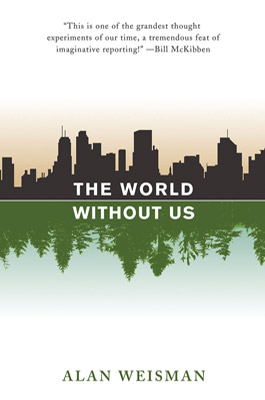
What if all human beings suddenly disappeared? Poof—no reason required. What would happen to the earth, our earth? As Alan Weisman explains in this intriguing thought experiment, most traces of us disappear—give or take a few millennia. Within days, without engineers to man the pumps, Manhattan’s subway tunnels reclaim their birthright as creeks, cultivating sinkholes in the streets above. Within 50 years most houses have collapsed. The Statue of Liberty, submerged by rising seas, survives, alongside most of the world’s bronze sculptures, old copper pennies, and the Chunnel. In 100,000 years or so, atmospheric carbon dioxide levels reset to prehuman levels. Yet, paradoxically, some things get worse. Without us to babysit them, abandoned nuclear and petrochemical plants burn, leak, melt down, and decay.
The World Without Us is as disturbing as the pronouncement of a terminal diagnosis and as fun as a spritz of schadenfreude, where the misfortune we cheer is the end of our own species. Weisman takes a long view of history, examining the bones and stones of ancient civilizations and our earliest hominid ancestors for clues to what might survive us. He tours odd corners of the world, uncovering scientists and engineers who deconstruct the final days of our greatest monuments. Without us monkeying with the planet, our closest kin rebound. Chimpanzees own Central Africa, while brainy baboons start our world-dominance experiment all over again.
Beyond this epic hypothetical quest, Weisman presents an emotional exercise the likes of which Buddhists have been advocating for ages: to meditate on the world after me. Although the human footprint is huge, it’s ultimately ephemeral. The planet will survive without us. Not the reverse.
















